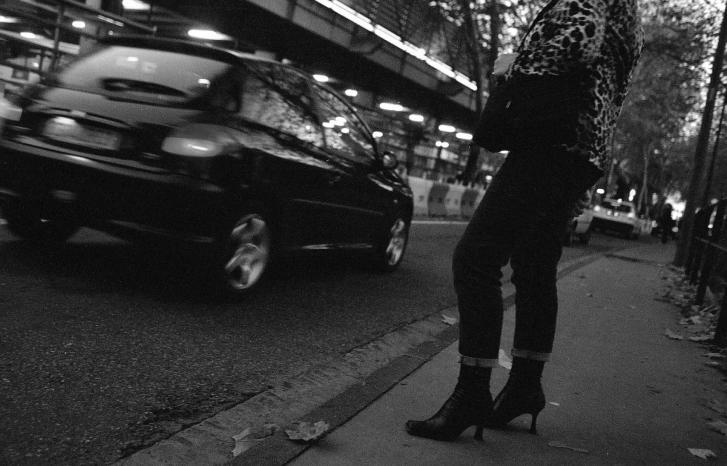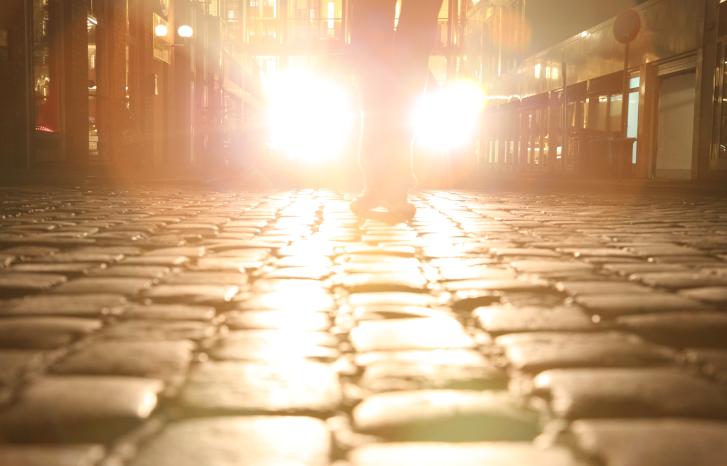The connection to Europe is visible in Benin City. The shop called Little Italy Plaza and the Hotel Torino are both owned by Nigerian women who work in the sex industry in Italy. Signs advertising courses in Spanish, Italian, French and Swedish are seen throughout the city.
There are also signs warning of the horrors of human trafficking, but people perceive these campaigns as a warning not to migrate. As long as migrants send money home to their families, which materializes in nice cars, houses and clothing, and as long as poverty and unemployment are endemic, the campaigns will not take hold.
It is estimated that about 85 percent of the Nigerian women who sell sex in Europe have travelled via Benin City. This is also where many of them return to when they are deported.
Random categories
For almost three years Sine Plambech, a social anthropologist at the Danish Institute for International Studies, has followed 30 returned Nigerian women and their families in Benin City as part of her doctoral project.
Half of the women were deported to Nigeria as illegal immigrants and half had been given status as victims of human trafficking. The latter group had returned via voluntary return programmes, which means they received financial support and follow-up from local organizations.
The women who took part in voluntary return programmes did not fare any better than the women who were deported.
“You would think that the women who get assistance would get by easier, but I can’t see that they do. Over time their situation ends up being the same as those who don’t receive support,” says Plambech.
Moreover, the European categorisation of who is a victim and who is an illegal alien is arbitrary and unsystematic.
“In the western world there is an intense focus on correctly identifying victims, on the importance of distinguishing between the women who are victims of human trafficking and those who aren’t. But my research shows that these categories are determined fairly randomly and as a result it’s coincidental as to who gets sent home as victims or who are deported as illegal immigrants.”
Family obligations
Migration to Europe is often a joint project involving the women who will migrate, her family and the madam who organizes the trip. Plambech’s informants use the word “madam” or “guide” about the person who is referred to in the West as “human trafficker”.
In 2012, a ticket and a forged visa could cost between $6,500 and $12,000. The total amount usually ends up being over $50,000.
In many cases families pawn their property to secure payment of the high cost. Sometimes it is pawned to the madam; in other cases to a broker, who then pays the madam.
“The family doesn’t distinguish between whether the woman has been deported or has returned voluntarily,” says Plambech.
“The families expect the women to have access to resources regardless of how and why they have come home. They might demand that the women return to Europe or try to get the women to support family members financially.”
One of Plambech’s informants, Cynthia, was forced to travel back to Europe after her first return to Benin City; otherwise her parents would have lost their home. Cynthia spent five years in Italy, came back to Benin City and stayed for two years, before travelling to Spain and then to Denmark. After two years in Denmark, she was categorised as an “illegal immigrant” and was deported again.

Financial instability
The women who return voluntarily do not have financial difficulties in the first year, according to Plambech. The financial support they receive covers their basic needs. For example, they can have their mortgage paid in advance for an entire year.
“In contrast to other migrants who are returned to countries such as Iraq and Afghanistan, these women do not receive the money directly. Instead the organizations take the women out shopping to buy things or they pay the mortgage for them, as if these women in particular can’t be counted on to use the money wisely,” says Plambech.
However, the women are not able to find stable, long-term sources of income. And the money runs out. Because of the stigma connected to the returned women, it is difficult for them to create new opportunities to earn money, and many of them have lost their social networks.
Grace, one of Plambech’s informants who returned voluntarily, used the financial support she received to buy some cooking pots and open a food stall on the outskirts of Benin City. It went well to begin with, but after two months Grace was robbed. Her money and pots disappeared. The organization that had given her money could not help her anymore.
See also: Norwegian ban on buying sex affects immigrant women
Vulnerable to crime
In addition to family demands, crime erases any remaining distinction between women who return voluntarily and those who are deported.
“The crime rate in the area where they live does not distinguish between victims of human trafficking and deportees,” says Plambech.
The violence is not perpetrated by their “traffickers”, like many Europeans believe.
“It has to do with the overall security situation in Nigeria and the area around Benin City,” says Plambech.
People are required to have an education if they want to open shops in “Government Reserved Areas”, areas that are protected by security guards. So the women are forced to stay in the outskirts of the city.
“The women don’t have the money or education to live in the safe areas of the city. They live in those areas with little electricity and poor roads, and they can’t afford to buy doors with proper locks.”
All the women interviewed by Plambech had been the victims of armed robbery or rape or both. Some of them experienced this in Europe; all of them experienced it after returning home. Since the women are believed to have resources after returning from Europe, they are even more vulnerable to robbery and burglary.
“Some of them said it was much safer to sell sex in Rome or Hamburg than to sell food from a food stall in Benin City,” says Plambech.
“It’s not my intention to shift the focus away from the people responsible for trafficking, but the same poverty and massive unemployment that produces undocumented migration and prostitution abroad also creates young male criminals and gangs in Benin City.”
Ethnography with disposable cameras
Due to the security situation in Benin City, Plambech could not always follow her informants in their daily lives. Crime, violence and armed robbery and kidnappings are common.
It would have been dangerous for Plambech to spend time where her informants lived. Likewise, it would have been risky for her informants to be seen with a white woman. It would have made them vulnerable to robbery and violence. The solution was a creative kind of ethnography. For example, Plambech gave the women disposable cameras and asked them to take photos and write in journals to document their lives. Plambech often conducted the interviews in an apartment she rented in the city centre.
Interviews on demand
Finding women who wanted to participate in the project was a long process. Deported women do not queue up and wait for Western researchers with questions. Some of the women receiving assistance, however, do just that.
A Catholic NGO offered Plambech interviews with three victims of human trafficking. This was a standing invitation that the organisation made to Western visitors: diplomats, journalists, donors and researchers. For each interview the guests paid the women $15, and they were expected to give the same amount to the nuns.
“The women told horrible stories that included all of the classic features of a Nigerian trafficking story. It was clear that they had told their stories many times before,” says Plambech.
“The ones who receive assistance have usually spent several years in the NGO system in Europe. They may have been in internment centres, visited by many social workers. In the end the women learn what to say to get certain reactions. If you say that you went to Europe to earn money for your family, you knew that you would sell sex and you bought the illegal papers yourself, then you probably won’t get help. If you say that you didn’t know you were going to sell sex, you get help.”
It was at the Catholic NGO that Plambech met Grace, who had recently returned after six years in Italy. Grace missed Italian gelato and pizza, so Plambech invited her to a pizza restaurant in the city. During the meal Grace told a more complicated story than she had before, and through Grace Plambech got to meet deported women who did not take part in the assistance programmes.
See also: Why Norway criminalized the purchase of sex
The rescue industry
In the wake of the international focus on human trafficking in the past decade, a large rescue industry has developed, which Plambech calls the “Rescue Industrial Complex”.
By this she means the large international organisations, national Norwegian and Danish organisations, the airlines that fly specially chartered planes filled to capacity with deported migrants, the security company that accompanies the flights, and finally the local organisations in places such as Benin City which receive money from abroad to support victims of human trafficking when they return.
Most of the local organisations in Benin City are Catholic or affiliated with Pentecostal churches, according to Plambech.
“They are highly moralistic and consequently focus on the women’s personal behaviour rather than critiquing the system,” says Plambech.
“In this way responsibility for the women’s situation becomes individualised, and there is enormous individual pressure on the women to return to and stay in Nigeria. They should change their behaviour, open a shop and provide for their families. By the same token, some of them live with trauma from their time in Europe and a difficult life in Nigeria.”
Plambech emphasises that many of the religious organisations do a lot of good work. But they also play a major role in creating and supporting a national narrative which says that the women who leave are greedy, possessed by evil spirits and a stain on the national image. They want to give the women their dignity back and in so doing give Nigeria its dignity back, according to Plambech.
Benin City – Europe, roundtrip

“The women know what kinds of job await them in Europe,” says the doctoral candidate.
“The women who migrated 5-10 years ago probably didn’t have as much information about what lay in store for them. Today they even negotiate the price of migration. After all, this is something that has been going on for a long time now.”
When Plambech spoke with Grace two years after she had returned, the only thing Grace had left from her status as a victim of human trafficking was the $15 she was paid each time she gave an interview about her experiences in Europe.
Cynthia hoped that she would manage to travel back to Europe again, for the third time. Before she was deported from Denmark, she got pregnant with a Danish man. The Danish man paid her debt and sent her money every now and then. However, it was a security risk to have a half-white son in Benin City’s bad neighbourhoods, and it was hard being a single mother.
The last resort
While the Danish system of dealing with human trafficking focuses mainly on returning the women, the Norwegian system has put more emphasis on investigating the cases in order to prosecute the people behind the smuggling.
The women Plambech has followed are not concerned with European court cases. They are interested in getting their lives on the right track. Returning voluntarily is always a last resort, when there is no other option, according to the researcher. This corresponds with the findings of Anette Brunovskis, researcher at Fafo – Institute for Applied International Studies, who has studied returned women from Albania, Serbia and Moldova.
The Nigerian women top the statistics on potential victims of human trafficking in Norway. Of 247 potential victims in 2011, 108 were from Nigeria. The second largest group was 28 Romanians. Potential victims are those who receive some form of follow-up within the Norwegian system. Voluntary returns are organised by the International Organisation for Migration Norway on agreement with Norwegian authorities.
“A key objective of the return and reintegration programme is to prevent trafficking from reoccurring, but so far we have limited knowledge about what has happened to the women who have chosen to return,” writes the coordination unit for victims of human trafficking under the Norwegian National Police Directorate in its report from 2012.
The unit writes that some women choose to return without assistance. Some travel to other European countries. Many disappear without a trace.
Translated by Connie Stultz.
Sine Plambech is in the final phase of her doctoral project on migration, Point of Departure: Life after human trafficking in Western Europe, at Columbia University in New York City and the University of Copenhagen. She is employed at the Danish Institute for International Studies.
Plambech presented her preliminary findings at the seminar Nigerian Migrant Sex Workers Upon Return – The Politics and Experiences of Rescue organised by Fafo – Institute for Applied International Studies on 18 April 2013.
She has previously conducted research on the sex industry and victims of human trafficking in Thailand, transnational marriage and the global care services economy.
Human trafficking is a punishable act pursuant to Section 224 of the Norwegian General Civil Penal Code with a maximum five years in prison.
Since 2003, Norway has adopted three action plans against human trafficking.
Prostitutes from Nigeria have been a dominant group in the street prostitution market in Norway since the summer of 2004.
According to the Fafo report Afrikanske drømmer på europeiske gater (“African dreams on European streets”), the Nigerian women often enter Italy and Spain with a Schengen visa and travel from those countries to other countries in Europe.
In 2011, 274 persons with 52 nationalities were followed up as potential victims of human trafficking in Norway. Of these, 108 were from Nigeria.
Five people were returned voluntarily through the International Organization for Migration from Norway in 2011; two women from Nigeria, one woman from South America, one woman from Eastern Europe, and one child belonging to one of the women. All four women were assumed to have been exploited for prostitution.
Sources: Store Norske Leksikon, Fafo – Institute for Applied International Studies



